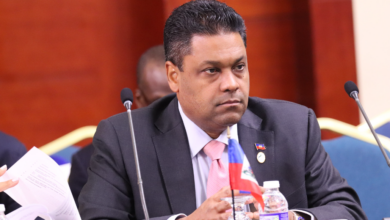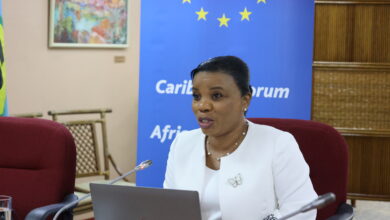It is indeed a privilege for me to address this opening session of the Twenty- Sixth Meeting of COHSOD in my capacity as Chairman of the Council. We are gathered here over the next two days to consider important matters related to the development of our region. The focus of the Meeting is on Labour and Gender Issues, issues which lie at the very heart of our development. During this meeting, we will look ‘through the gender lens’ at the progress we have made in the implementation of the CSME, at our progress towards implementation of decent work programmes in the region and also at the major area of human capacity development with a focus on preparing our youth for employment. Together we will examine legislative, policy and other options for advancing the work in these major areas.
This Meeting is taking place at a time when the international Community is engaged in two important processes, preparation for the Third SIDS Global Conference in Samoa in September of this year and the Development of a Global Development Agenda for the post 2015 period, following the deadline for achievement of the Millennium Development Goals. The outcomes of these processes will continue to guide development cooperation and development assistance at all levels, as the MDGs did. The Post 2015 Development Agenda is intended to address the economic, social and environmental aspects of development in a holistic manner. The main rationale and thrust of the proposed agenda is captured in the following quote from the UN Task team on Human rights.
‘The narrow models of economic analysis that characterized development approaches in the pre-2015 period have proved inadequate in many respects. It should by now be seen as axiomatic that economic growth, where accompanied by significant inequalities, environmental degradation, repression, and structural indignities, is neither sustainable in the long term, nor morally acceptable in the immediate term. Nor can a focus on any narrow and selective set of socio-economic indicators satisfy the real demands of development’
Even as the region prepares itself for participation in these fora in order to ensure that the regional priorities for development are taken into account, it does so against the backdrop of a combination of challenging circumstances, including the global financial crisis, the effects of ‘graduation’ of Member States on concessionary sources of financing, natural disasters and the effects of climate change. Unemployment among youth is on the rise, with young women being the more disadvantaged group in spite of better educational outcomes. Youth crime and violence is also on the rise and this has contributed to perceptions of growing insecurity in the region, with implications for areas such as tourism and widening poverty gaps.
The Sustainable Development paradigm forces us to take cognizance of the inextricable linkages and interdependence within, between and among the economic social and environmental facets of development. If we are to be successful in implementation of this conceptual model of development, then there needs to be a significant shift in the way in which we do business both nationally as well as regionally. Economic and social development for example must be addressed simultaneously as they are mutually reinforcing; the latter is not merely derived when the former has been achieved. The policy coherence so necessary across economic, social and environmental policies, implies among other things, increased inter- sectoral coordination among government departments and institutions, and the inclusion and meaningful participation of non state actors (private sector and civil society) in governance and decision making.
Within the Council for Human and Social Development COHSOD there has been significant effort at inter-sectoral consideration of issues, but this is not always mirrored at the national level and sometimes renders the regional initiatives less effective. This Meeting for example, turns the spotlight on gender issues especially in the context of the Implementation of the Single Market and Economy, and also with regard to the Decent Work Agenda and Human Resource development. Within the regional arrangements there should perhaps be some room for joint meetings of the Ministerial Councils in order to effect the policy coherence deemed imperative.
We now live and work in what is referred to as the knowledge based economy, fueled by information, driven by knowledge and facilitated by rapid advancement in Information and Communication Technologies (ICTs). Knowledge has become a major factor of production and the new ICTs have spawned the development of new industries based on ‘weightless goods’ with high knowledge content. WE are part of a global system in which opportunities are opening up for millions through new technologies. The job market is witnessing radical changes in occupational profiles, job design and content of occupations. In both manufacturing and service sectors; competitiveness and success are inextricably linked to the extent to which enterprises are able to incorporate knowledge and new technologies into the productive processes. A highly skilled workforce is absolutely essential if the region is to compete successfully in the digital economy and take advantage of new sources of growth in areas that will drive innovation and create new job opportunities.
Of specific interest to this meeting is the examination of what this new and ever emerging environment demands in terms of skills and competencies of the workforce, as work itself, and skills are continually being redefined and reorganized. Over the past decade the region has made great strides in the reorienting of Technical and Vocational Education and Training, with the shift from a supply driven to a demand led system with the establishment of a system of Caribbean Vocational Qualifications, which has made available to employers persons more readily employable and which has facilitated movement of certain categories of workers in the Single Market and Economy. Yet there is still a long road ahead of us even in this area as we work towards putting the system on a firmer footing in some of our Member States, thus ensuring that it does not become in itself, a means of exclusion of some from the regional Labour Market.
Some of the key questions relate to
(i) whether systems for education and training are preparing persons for the new workplace and for entrepreneurship
(ii) whether issues of cost and access to technology are creating new and greater divides and social exclusion
(iii) whether information and intelligence related to existing and emerging opportunities in the labour market are available to economic and education planners
Our Heads of Government, at the 34th Regular Meeting of the Conference in St Vincent and the Grenadines in March of this year paid specific attention to these issues as they focused on Advancing the Regional Agenda For Sustainable Development using Information and Communication Technologies ICT for Development and also the urgent imperative of addressing Human Resource Development. The Conference recognized the mismatch between the skills needed for development and those currently targeted in our schools and universities and mandated the establishment of a broad based Commission on Human Resource Development to develop to shape a Regional Education and Human Resource Development 2030 Strategy that would form the basis for converged action by Member States and create a framework for the CARICOM Education Agenda. The Conference also stipulated that the Commission should ensure meaningful engagement with Ministries of Education, and collaboration with key civil society actors, in particular labour and the private sector on perspectives and key proposed actions.
It is important for us to keep in mind always that the successful transition of our economies cannot take place without the integral involvement of labour organizations and our private sector in the development of policy and strategy. The principles underpinning the Decent Work Principle and Agenda, namely – employment, rights, protection and dialogue recognise social dialogue as both an objective in its own right, guaranteeing participation and democratic processes, but also just as importantly, a means of achieving all other aspects of Decent Work. Throughout the Agenda for this Meeting, specific focus will be given to examination of the qualitative aspects of employment, the differential effects of our legislation, policies and implementation of programmes on men and women, opportunities for work that are productive and deliver a fair income, good working conditions and security in the workplace, and prospects for personal development.
Over the past months, our Community has been engaged in the Development of a Strategic Plan for the Development of our region. As Member States, we have made an input into that plan through the national consultations that were held in all Member States. The Secretary General has apprised us of the major proposed elements of that plan. Our Agenda over the next two days indeed addresses important elements of that resilience which we are seeking to build.
I would like to join with those who have spoken before me in expressing appreciation to the ILO, to UNWOMEN, to the CDB for their technical and financial support for this meeting and for their continual interest in working at both national and regional levels to improve the lives of the people of the region.
Ladies and gentlemen, this Meeting of COHSOD provides an opportunity for us as ministers with responsibility for Labour and Gender to examine jointly. important issues related to the achievement of sustainable development of our region. It provides us with the opportunity to consider mechanisms for enhancing the role of the CARICOM Single Market and Economy in our development, to distil and articulate positions for inclusion in the SIDS and Post 2015 processes, to re-examine our own roles in the new strategic directions being outlined for our Community; to recognise and take advantage of functional cooperation among CARICOM Member States to advance our national agendas and most importantly to make a difference in the lives of the people of the region as we work towards making this truly a Community for All’
I thank you




